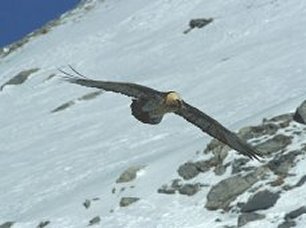|
The
Fanes' saga - Short essays
The vulture
The
vulture of the Dolomites is the gypaetus, or bearded vulture (Gypaetus
barbatus; in German: Bartgeier; in Ladinian: Variul;
in Italian: Avvoltoio degli agnelli). Hunted to extinction
at the end of the XIX century, it is being reintroduced in these
years. It has been sighted, e.g., on the Tofane; its nesting places
are kept strictly secret.
Larger
than a golden eagle, for which it can be mistaken, the
bearded vulture can reach a wing span of 270 cm and a
weight up to 7 kg. Tail and wings are dark, while head
and breast are reddish. At the base of his powerful beak
it shows a sort of black bristles.
Both in Italian and German it is also named “lamb
vulture”, what should imply a propension to feed
on medium-to-small animals; its diet consists however
in prevalence of bleached bones. Very powerful gastric
juices allow him to digest this food, that other predators
don’t dispute. The vulture breaks the big bones
he can’t gulp directly, throwing them on the rocks
from a height of several tens of meters.
|
 |
In
the Fanes’ legend, the vulture represents the totemic animal
adopted by the Fanes when they relinquish their ancient marmot
and their lifestyle becomes aggressive and inclined towards predation.
|

